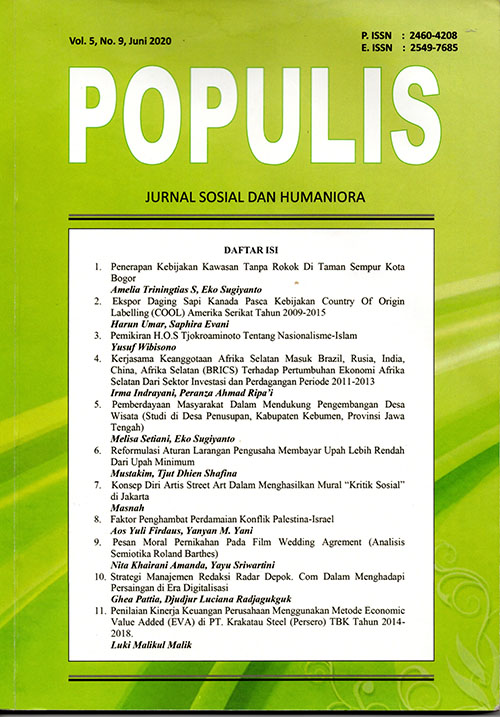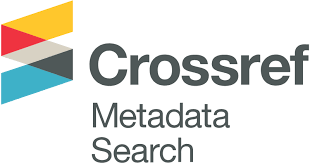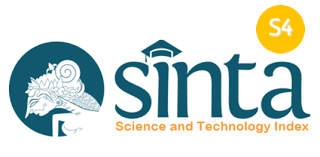Ekspor Daging Sapi Kanada Pasca Kebijakan Country Of Origin Labelling (COOL) Amerika Serikat Tahun 2009-2015
DOI:
https://doi.org/10.47313/pjsh.v5i1.829Keywords:
country of origin labelling, ekspor daging sapi, kanada, kepentingan nasional, amerika serikatAbstract
Kehadiran kebijakan luar negeri memiliki pengaruh yang besar bagi pelaksanaan kehidupan bernegara setiap aktor internasional, terutama bagi negara super power seperti Amerika Serikat. Kondisi tersebut membuat Amerika Serikat memiliki kontrol terhadap negara lainnya dengan melakukan tindakan yang hanya menguntungkan sebelah pihak saja, seperti melakukan proteksi. Kebijakan Country of Origin Labelling (COOL) merupakan salah satu bentuk proteksi yang dilakukan oleh Amerika Serikat dengan tujuan untuk membatasi jumlah daging sapi impor dari Kanada yang masuk ke pasar Amerika Serikat karena telah terkontaminasi oleh penyakit Bovine Spongiform Encephalopathy (BSE) atau sapi gila yang sangat berbahaya bagi kesehatan manusia. Implementasi kebijakan COOL tersebut berhasil membuat jumlah ekspor daging sapi Kanada menurun sehingga menyebabkan defisit pada neraca perdagangan negaranya. Oleh karena itu, Kanada harus memilki upaya untuk menjaga stabilitas ekspor daging sapinya sehingga dapat memberikan keuntungan bagi perekonomian Kanada serta tercapainya kepentingan nasional negara.
References
Agriculture and Agri-Food Canada. (2019). An Overview of the Canadian Agriculture and Agri-Food System 2016, di akses pada 2 Desember. http://www.agr.gc.ca/eng/about-us/publications/economic-publications/an-overview-of-the-canadian-agriculture-and-agri-food-system-2016/?id=1462288050282.
Burchill, Scott. (2005). The National Interest in International Relations Theory, New York: Palgrave Macmillan.
Canada-United States Free Trade Agreement (CUSFTA).
Centers for Disease Control and Prevention. (2019). Creutzfeldt-Jakob Disease, Classic CJD : Occurrence and Transmission, di akses pada 28 Agustus. https://www.cdc.gov/prions/cjd/occurrence-transmission.html.
Centers for Disease Control and Prevention. (2019). BSE Cases Identified in Canadian–Born Cattle, di akses pada 20 April. https://www.cdc.gov/prions/bse/case-canadian-cattle.html.
International Trade Center, List of Importing Markets for a Product Exported by Canada – Product: 0201 Meat of Bovine Animals, Fresh or Chilled, di akses pada 10 Desember 2019. https://www.trademap.org/Country_SelProductCountry_TS.aspx?nvpm=1%7c124%7c%7c%7c%7c0201%7c%7c%7c4%7c1%7c1%7c2%7c2%7c1%7c2%7c1%7c1
Mill, John Stuart. (1885). Principles of Political Economy – with Some of Their Applications to Social Philosophy Volume I. New York: D. Appleton and Company. Di akses pada 12 Mei 2019. https://books.google.co.id/books/about/Principles_of_Political_Economy.html?id=1PBDF5zX1k8C&printsec=frontcover&source=kp_read_button&redir_esc=y#v=onepage&q&f=false.
Ricardo, David. (1819). On the Principle of Political Economy and Taxation (2nd Edition). John Murray. London.
Smith, Adam. (1976). The Wealth of Nation. Matheus.Co,Ltd. London.
The Perishable Agricultural Commodities Act of 1930.
United States Department of Agriculture. (2019). Country of Origin Labelling (COOL), di akses pada 20 April 2019. https://www.ams.usda.gov/rules-regulations/cool.
World Trade Organization. (2011). United States–Certain Country of Origin Labelling (COOL) Requirements. Report of the Panel WT/DS384/R and WT/DS386/R.
Downloads
Published
Issue
Section
License
- Hak publikasi atas semua materi informasi yang tercantum dalam situs jurnal ini dipegang oleh dewan redaksi/editor dengan sepengetahuan penulis. Pengelola Jurnal akan menjunjung tinggi hak moral penulis.
- Aspek legal formal terhadap akses setiap informasi dan artikel yang tercantum dalam situs jurnal ini mengacu pada ketentuan lisensi Creative Commons Atribusi-NonCommercial-No Derivative (CC BY-NC-ND), yang berarti bahwa hanya dengan izin penulis, informasi dan artikel Jurnal BACA dapat didistribusikan ke pihak lain dengan tanpa merubah bentuk aslinya untuk tujuan non-komersial.
- Setiap terbitan Populis Jurnal Sosial dan Humaniora, baik cetak maupun elektronik, bersifat open access untuk tujuan pendidikan, penelitian, dan perpustakaan. Di luar tujuan tersebut, penerbit atau pengelola jurnal tidak bertanggung jawab atas terjadinya pelanggaran hak cipta yang dilakukan oleh pembaca atau pengakses.










